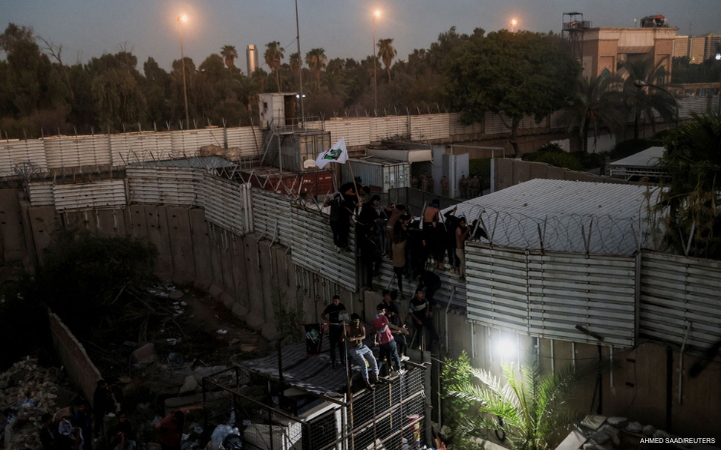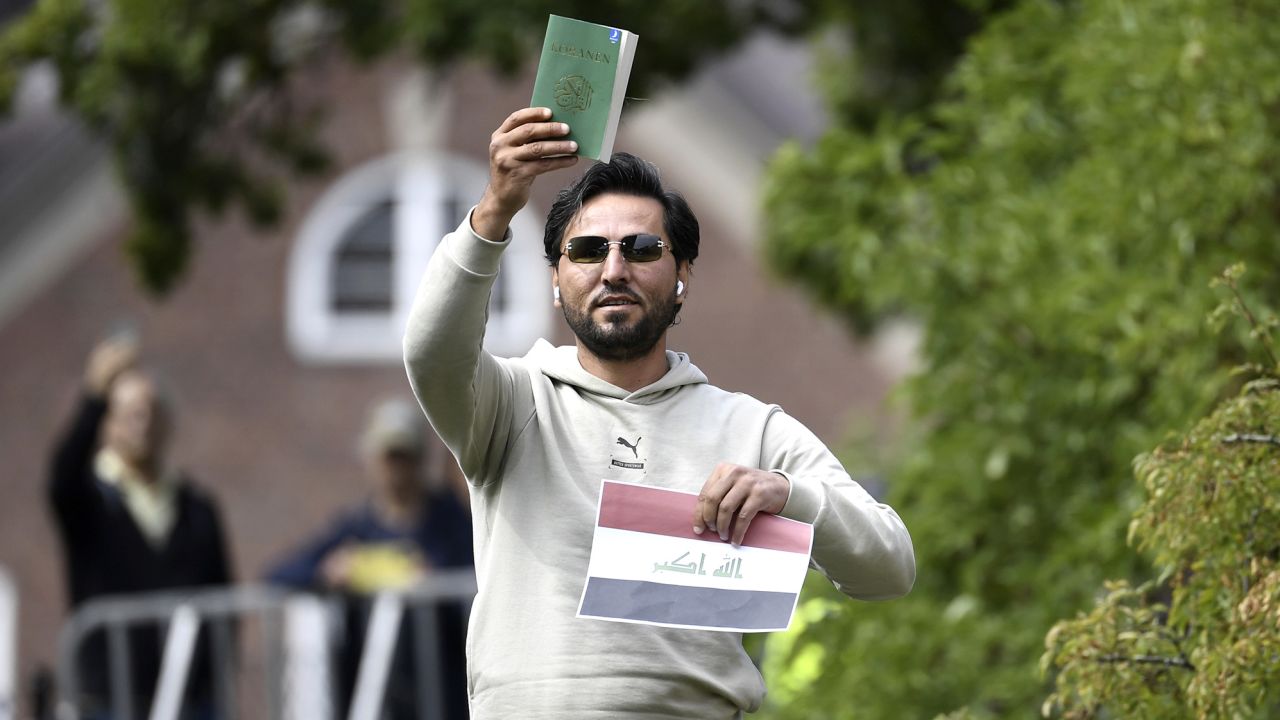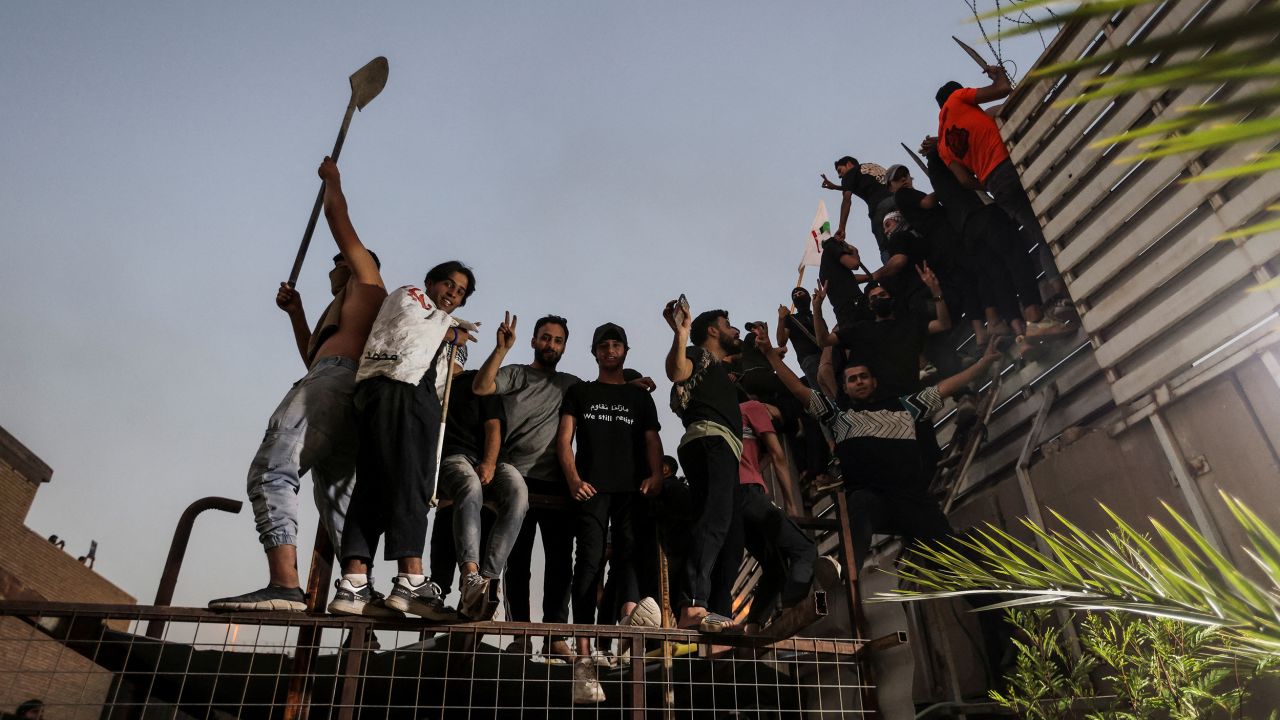
Videos posted on social media showed a large number of protesters inside the Swedish embassy’s perimeter as well as black smoke and fire coming from the building.
Security forces armed with electric batons chased protestors and used water cannons to disperse them and put out the fire, a security source told CNN.
Eyewitnesses told CNN that the protesters withdrew from the perimeter of the Swedish Embassy after setting part of it on fire “after delivering their message of protest against the act of burning the Holy Book of God.”
Several journalists covering the protests were detained by security forces, and at least one was beaten, according to multiple organizations.
“Journalists should be free to report the news without fear of harassment or harm, wherever they are,” Reuters Iraq Bureau Chief Timour Azhari tweeted Thursday. Two detained Reuters journalists were released after several hours, the agency said.
Ziyad Al-Ajili, the head of the Iraq-based Journalistic Freedoms Observatory (JFO) told CNN that three photojournalists working with international news agencies were arrested and another was beaten by security forces and his camera destroyed.
CNN has reached out to the Iraqi government for comment.
The planned protest in Sweden took place later on Thursday outside the Iraqi embassy in Stockholm. It was organized by Salwan Momika, an Iraqi national in Sweden who burned a copy of the Quran outside a mosque in Stockholm last month during the Muslim holiday of Eid-al-Adha, in a solo that sparked outrage in Iraq and around the world.
Ultimately no Qurans were burned during Thursday’s protest, according to videos seen by CNN, but footage showed two protesters kicking and partially destroying a Quran, and Momika stepping on a Quran and polishing his shoes with a picture of the Iraqi flag.
A Stockholm police spokesperson said there were two people in attendance with a permit for the protest and estimated that another 150 people were present, most of them reporters.

The Swedish police have stressed that they only grant permits for people to hold public gatherings and not for the activities conducted during them, AFP reported.
‘Serious violation’
Swedish and Iraqi authorities exchanged heated words over the protests, as Baghdad threatened to sever diplomatic ties with Stockholm over Quran-burning demonstrations sanctioned by the state.
“Granting permission under the pretext of freedom of expression is viewed as provocative and contrary to international covenants and norms, which emphasize respect for religions and beliefs,” the Iraqi prime minister’s office said.
Turkey, Iran and Saudi Arabia also publicly condemned the holy book’s desecration in Sweden, with authorities in Tehran and Riyadh summoning Swedish diplomats to express their anger.

Prominent Iraqi Shiite cleric Moqtada al Sadr, whose supporters were behind the protests at the Swedish embassy, said that “Sweden’s hostility towards Islam and the holy books by giving permission to burn the Iraqi flag means Sweden doesn’t believe in Iraq.
“It’s on the government to not just express condemnation and denunciation as that shows weakness and complacency,” Sadr said.
However, the Iraqi Foreign Ministry also condemned the attack on the Swedish embassy, calling it part of a concerning pattern of assaults on diplomatic missions.
The Iraqi government held an emergency meeting on Thursday to turn in the arrested individuals arrested in Baghdad to the judiciary, adding that “negligent security officials will be investigated and face appropriate legal measures.”
Swedish authorities too condemned the demonstrations in Baghdad, calling the actions of protesters “completely unacceptable.” Iraq’s charge d’affaires in Stockholm has been summoned, Sweden’s Foreign Minister Tobias Billström said on Thursday.
Sweden’s embassy staff in Baghdad are all safe amid protests outside of the building, the foreign ministry’s press office told CNN via email.
“We condemn all attacks on diplomats and staff from international organizations. Attacks on embassies and diplomats constitute a serious violation of the Vienna Convention. Iraqi authorities have the responsibility to protect diplomatic missions and diplomatic staff,” it said.
Iraq later recalled its chargé d’affaires from the Iraqi embassy in Stockholm, and asked the Swedish ambassador in Baghdad to leave the country, an Iraqi government spokesperson said Thursday.
Iraq also suspended Swedish telecom giant Ericsson’s license in the country in response to the demonstration in Stockholm.
Ericsson told CNN in a statement on Thursday that the incidents in Stockholm “involving the burning of the Holy Quran is deeply offensive to the religious beliefs and values cherished by Muslims around the world.
“This act does not reflect Ericsson’s core value of respect.”
The European Union echoed Sweden’s condemnation of the attack in Iraq overnight, saying it hoped for a “swift return to normality” in the relations between both countries.
The diplomatic fallout saw the United States “strongly” condemn the attack on Thursday. The US emphasized that freedom of peaceful assembly is vital to democracy, but this violent act was unlawful and unacceptable, US State Department spokesperson Matthew Miller said in a statement.
“Foreign missions should not be targets of violence. We call on the Government of Iraq to honor its international obligations to protect all diplomatic missions in Iraq against any intrusion or damage, as required by international law,” Miller said.
Miguel Moratinos, the high representative of the United Nation’s Alliance of Civilizations (UNAOC), said the the desecration of sacred religious books is not freedom of expression but rather an expression of contempt and religious hatred.
“The High Representative also condemns the acts of violence and the storming of the Swedish Embassy in Baghdad today,” the statement read.
“He re-iterates that the desecration of sacred religious books and religious sites is a disrespectful and provocative act. Such acts often lead to agitation and incitement to violence. At the same time, he stresses that violence is never an appropriate response to provocation,” the statement added.
CNN’s Sharon Braithwaite, Henrik Pettersson, Nechirvan Mando, Alex Hardie, Sugam Pokharel and Hande Atay Alam contributed reporting.




